A dental crowns, also known as a cap, is like a custom-made tooth that fits over your existing tooth to restore its shape, size, strength, and appearance. It’s like a tiny helmet for your tooth
Purpose of dental crowns:
A dental crown, also known as a cap, is a tooth-shaped restoration that fits over a damaged or weakened tooth to restore its function, appearance, and strength. Think of it like a tiny, custom-made helmet for your tooth! Here’s a closer look at the purposes of dental crowns:
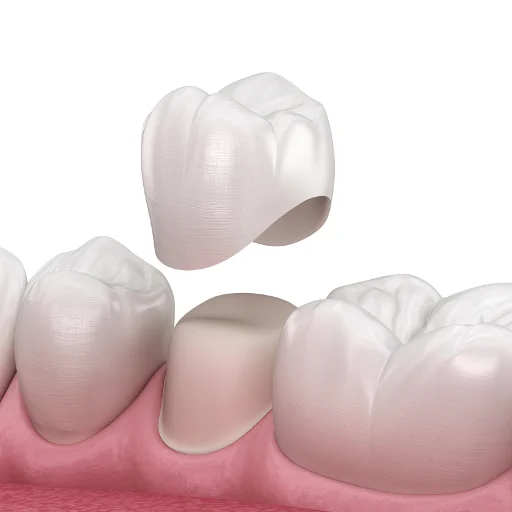
Protection:
- Shields a weak tooth: If a tooth has a large cavity, cracks, chips, or excessive wear and tear, a crown can protect it from further damage and prevent it from breaking. This is especially important for teeth that have undergone root canal treatment, as they become brittle and more susceptible to breakage.
- Reinforces a cracked tooth: If a tooth has developed a crack, a crown can hold the pieces together and prevent the crack from worsening. This can save the tooth from needing extraction and replacement.
Restoration:
- Rebuilds a broken tooth: If a significant portion of the tooth has broken off, a crown can be used to rebuild it to its original shape and size. This allows you to chew and speak normally again.
- Replaces a large filling: If a tooth has a large cavity that requires a large filling, the remaining tooth structure may be weak and vulnerable to breakage. A crown can be placed over the filling to provide additional support and protection.
Aesthetics:

- Conceals discoloration: If a tooth is discolored due to staining, trauma, or medications, a crown can be used to cover it up and restore its natural appearance.
- Improves misalignment: If a tooth is misaligned or misshapen, a crown can be used to reshape it and improve its appearance. This can also make it easier to keep the tooth clean and prevent the buildup of plaque and tartar.
- Bridges the gap: Crowns can be used to anchor a dental bridge, which is a fixed partial denture that replaces one or more missing teeth. The crowns are placed on the teeth on either side of the gap, and the bridge is then attached to the crowns.
Overall, dental crowns are a versatile and effective treatment option for a variety of dental problems. They can help to protect your teeth, restore their function, and improve their appearance. If you have any questions about whether a dental crown is right for you, be sure to consult with your dentist.
Material of dental crowns:
The material of your dental crown will depend on your needs and priorities, each with its own advantages and disadvantages:

Metal Crowns:
- Gold: The most durable and biocompatible option, highly resistant to wear and tear. However, it’s the most expensive and has a metallic appearance.
- Palladium-based alloys: Strong and aesthetically more pleasing than gold, but still not as natural-looking as other options. Affordable and resistant to corrosion.
Porcelain-Fused-to-Metal (PFM) Crowns:
- Combines the strength of metal with the aesthetics of porcelain. More affordable than pure gold crowns. However, the metal edge might be visible, especially if gums recede.
All-Ceramic Crowns:
- Zirconia: Most natural-looking and biocompatible material, resembling natural teeth in translucency and color. Durable, but not as strong as metal for heavy chewing.
- Emax, Empress, LiSi: Other glass-ceramic types, offering good aesthetics and strength for front teeth. May not be suitable for heavy grinding or bruxism.
Resin Crowns:
- Least expensive option, suitable for temporary crowns or back teeth where aesthetics are less important. Less durable than other materials and can wear down over time.
Ultimately, the best material for your dental crown will depend on your individual needs and priorities. Discussing these with your dentist will help determine the most suitable option for your specific situation.
Procedure of dental crowns:
The procedure for getting a dental crown typically involves two visits to your dentist:

First Visit:
- Preparation: Your dentist will numb the area around the tooth. Then, they’ll remove some enamel from the tooth’s surface to create space for the crown and ensure a proper fit. This may involve drilling, but shouldn’t cause significant discomfort.
- Impressions: To make your custom crown, your dentist will take impressions of your prepared tooth and surrounding teeth. This can be done with traditional putty-like material or with a digital scanner.
- Temporary Crown: If your permanent crown won’t be ready immediately, your dentist will likely place a temporary crown made of acrylic or resin. This protects the prepared tooth while you wait for the permanent one.
Second Visit:
- Permanent Crown: Once your permanent crown is ready (usually within a few weeks), you’ll return to the dentist. They’ll remove the temporary crown and check the fit of the permanent one. Minor adjustments might be made.
- Cementing: Finally, your dentist will cement the permanent crown onto your prepared tooth using a strong dental adhesive. This ensures a secure and long-lasting bond.
Here are some additional details to keep in mind:
- Depending on the complexity of your case and the crown material chosen, the number of visits and the time involved may vary slightly.
- Some dentists have CEREC machines that can mill a permanent crown in-office during your first visit, eliminating the need for a temporary crown and second visit.
- After getting your crown, it’s important to practice good oral hygiene by brushing and flossing regularly. You should also avoid chewing on hard objects like ice or candy, which could damage the crown.
Aftercare of dental crowns:
Taking care of your dental crown after placement is crucial for its longevity and your overall oral health. Here’s a guide to proper aftercare for both temporary and permanent crowns:

Temporary Crowns:
- Be gentle: Treat your temporary crown with care as it’s not as strong as the permanent one. Avoid chewing on hard or sticky foods, and be mindful when flossing not to dislodge it.
- Mind your bite: Chew food on the opposite side of your mouth where the temporary crown is located to minimize pressure on it.
- Don’t miss your appointment for the permanent crown placement to prevent the temporary one from staying on for too long, increasing the risk of complications.
Permanent Crowns:
- Initial sensitivity: It’s common to experience mild sensitivity or discomfort around the crown for a few days, especially when exposed to hot or cold temperatures. You can manage this with over-the-counter pain relievers as recommended by your dentist.
- Oral hygiene: Maintain good oral hygiene by brushing twice daily with a soft-bristled toothbrush and gentle flossing around the crown margin. Use an antibacterial mouthwash if recommended by your dentist.
- Diet restrictions: Avoid chewing on hard objects like ice, nuts, or candy, as they can crack or damage the crown. Steer clear of sticky foods like caramels or taffy that can pull on the margins.
- Bruxism: If you grind or clench your teeth (bruxism), consider wearing a mouthguard at night to protect the crown from excessive wear and tear.
- Regular checkups: Schedule regular dental checkups and cleanings for professional monitoring and maintenance of your crown. Early detection of any issues ensures timely intervention and prevents complications.
Additional Tips:
- If you experience persistent pain, swelling, or difficulty biting, contact your dentist immediately.
- If the crown feels loose or chipped, don’t try to fix it yourself. Schedule an appointment with your dentist for proper evaluation and repair.
- Invest in a water flosser for easier cleaning around the crown and gum line.
- Remember, even with proper care, crowns can eventually wear out or deteriorate. Be aware of any changes and keep your dentist informed for necessary replacement.
By following these aftercare tips, you can ensure your dental crown lasts for many years and keeps your smile healthy and beautiful.
Risk and Complications:
While dental crowns offer numerous benefits in restoring tooth health and appearance, they do come with certain risks and potential complications. It’s essential to be aware of these before deciding on this treatment option:

Short-term Complications:
- Discomfort and sensitivity: After crown placement, some temporary discomfort around the treated area is common, especially during the first few days. This might include sensitivity to hot and cold foods or beverages. Over-the-counter pain medication usually helps manage this.
- Gum irritation: The new crown might initially irritate the surrounding gum tissue, causing temporary inflammation and soreness. Proper oral hygiene and regular dental checkups help minimize this risk.
- Temporary crown issues: Temporary crowns are weaker and more prone to dislodging or chipping, especially if you chew on hard things. If this happens, contact your dentist promptly for a replacement.
Long-term Complications:
- Crown loosening or detachment: Over time, the cement holding the crown in place might weaken, causing it to loosen or even fall off. This can happen due to improper oral hygiene, chewing on hard objects, or grinding/clenching teeth (bruxism).
- Tooth decay under the crown: Although it’s rare, bacteria can still accumulate under the crown’s margin, leading to decay in the underlying tooth structure. This is why maintaining good oral hygiene and regular dental checkups are crucial.
- Allergies or sensitivity to crown material: Some patients might experience allergic reactions or sensitivity to specific crown materials like metal alloys. Discuss any potential allergies with your dentist beforehand.
- Damage to opposing teeth: If the crown’s bite isn’t adjusted properly, it can create excessive pressure on the opposing teeth, leading to chipping or wear and tear. Regular dental checkups help ensure proper bite alignment.
- Root canal treatment need: In rare cases, the placement of a crown might aggravate existing problems in the underlying tooth, eventually requiring root canal treatment.
Minimizing Risks:
- Choosing the right material: Discuss material options with your dentist based on your specific needs and potential allergies.
- Maintaining good oral hygiene: Brush twice daily, floss regularly, and use mouthwash as recommended by your dentist.
- Avoiding hard foods and bruxism: Be mindful of what you chew on and consider a mouthguard if you grind your teeth at night.
- Regular dental checkups: Schedule regular checkups and cleanings for your dentist to monitor the crown’s condition and address any potential issues early on.

By discussing these risks and complications with your dentist and adhering to proper aftercare, you can minimize the chances of problems and maximize the success and longevity of your dental crown.
Remember, open communication with your dentist is key to any dental treatment. Don’t hesitate to ask questions or voice any concerns you have about dental crowns.
Final Thoughts:
Dental crowns, tooth-shaped caps protecting and restoring damaged teeth, offer a versatile solution for a variety of dental woes. From restoring broken teeth and strengthening weakened ones to enhancing smiles and anchoring bridges, crowns combine functionality with aesthetics. While some temporary discomfort and long-term care considerations exist, proper material selection, meticulous hygiene, and regular checkups ensure you reap the many benefits of a beautiful, healthy smile for years to come.
Derma and Dental Clinic:
Derma & Dental Clinic stands out with its team of experienced doctors backed by scientific evidence in their chosen fields. Their diverse range of medical-grade procedures offer tailored solutions for various skin and dental needs. You can confidently book your consultation online or by phone and embark on your journey towards healthier skin and a radiant smile.
Location: Bahria Town, Lahore
Specialties: Dermatology and Dental Care
Website: Derma.pk
For Consultation:
- Online at Dermatology.pk
- WhatsApp: +923205999650
- Phone: 03041115000

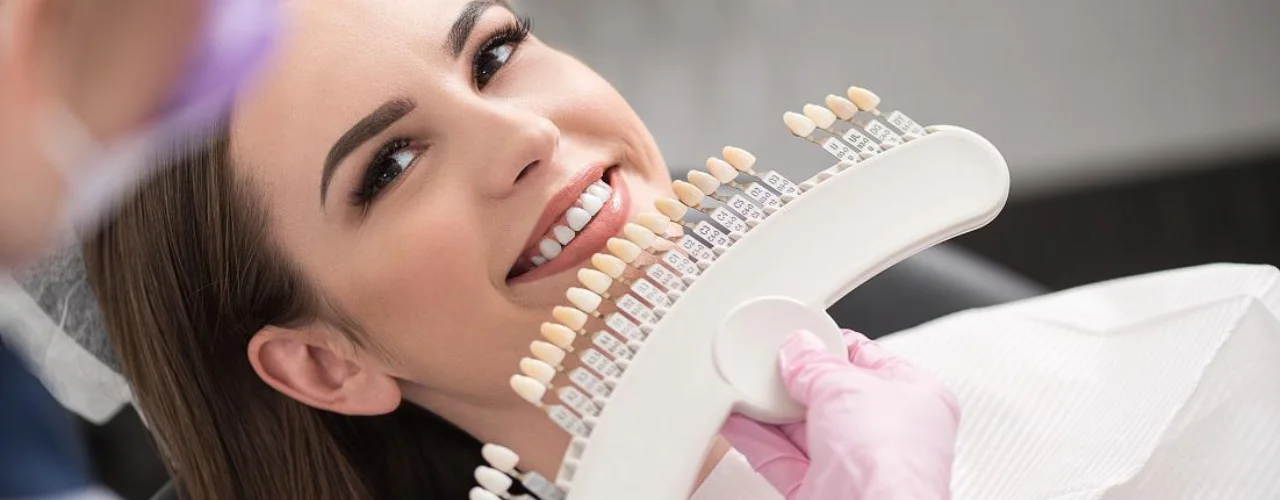



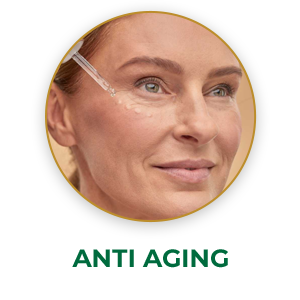




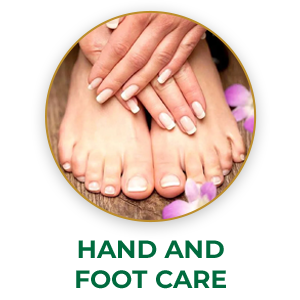



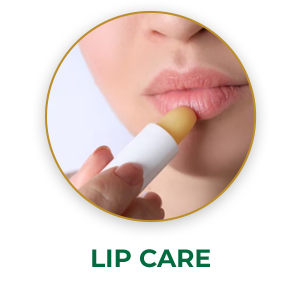





[…] Art and Science of Smile Design: A Dentist’s Guide to Crafting Beautiful Smiles Dental Crowns: Your Guide to Restoring Smiles and Boosting Confidence A Comprehensive Guide to Dental Fillings: Understanding, Benefits, Risks, Recovery, and […]
[…] Dental Crowns: Your Guide to Restoring Smiles and Boosting Confidence […]
[…] Benefits of Dental Bonding for Oral Health Dental Crowns: Your Guide to Restoring Smiles and Boosting Confidence A Comprehensive Guide to Dental Fillings: Understanding, Benefits, Risks, Recovery, and […]